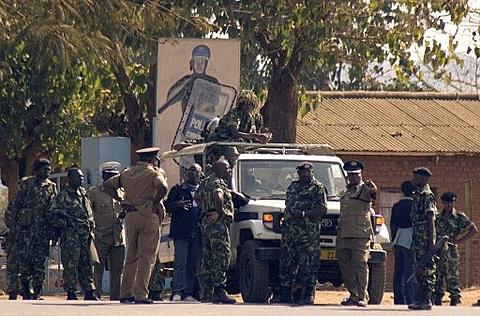Last year SALC secured bail for a seriously ill prisoner in the case of Mphembedzu v The Republic MHC Bail Case No. 70 of 2011. This case sought to profile health issues in the prison population in Malawi and the bail rights afforded to detainees suffering ill-health. The case concerned the arrest of a 15-year-old boy, Mr Mphembedzu, on suspicion of homicide in 2007. For the last four years he has been remanded at Bvumbwe prison while he awaits trial. Mr Mphembedzu is seriously if not terminally ill after contracting his illness during his imprisonment. A written judgment in this matter was only delivered in 2012. Although the judgment secured the release of Mr Mphembedzu, the precedential value of the case is to an extent diluted by the judge’s failure to engage with the issues that were before him.

Case law prior to this case deemed that bail should only be granted in cases of terminal illness and only if the illness cannot reasonably be managed in prison. It also states that health considerations of bail applicants is not per se a ground for consideration in bail proceedings and therefore is not necessarily mandatory. This legal position was set out in the judgment, Chidumaya, Sainni and Lambat v. The Republic, MSCA No 202 of 2008. This case was however heard prior to the coming into force of the Bail Guidelines Act of 2000, which stipulates that the health of a prisoner should always be a consideration when evaluating bail applications.
Whilst SALC was awaiting judgment in Mphembedzu the judge indicated that he wished to issue an oral directive granting bail to the applicant on certain conditions instead of writing a judgment. Concerned that the value of this decision would be lost if communicated orally, SALC instructed counsel to privately approach the judge to emphasize the importance of writing a precedent-setting judgment in this matter and request that he write a full judgment. The judge declined to do so and advised SALC’s counsel that it would take him a very long time to write a judgment of this nature and that during that time Mr Mphembedzu would remain incarcerated and the continued detention of the applicant “would be on our heads.”
Concerned about the well-being of Mr Mphembedzu SALC assisted in the preparation of a draft order which would carry some precedential weight. The judge again declined to adopt the draft order and reluctantly wrote a judgment on the case.
The judges’ truculence at having to write a judgment is evident in his disgruntled attitude towards the applicants counsel. At page 2 of the judgment the judge notes:
“[L]et me at the outset confess that there has been a delay in the preparation of this Ruling due to the insistence by Counsel for the Applicant on a formal written Ruling considering the issues raised in his Skeleton arguments, the fact that the State had not objected to his client’s release on bail on conditions, notwithstanding. The matter thus became more of an academic exercise on the part of this Court than a practical one.”
The judge’s comments are concerning because they fail to acknowledge or appreciate his function and role as a judicial officer. Where there is a gap between law and policy or where there is uncertainty in interpreting legislation one of the core judicial functions is to clarify the matter in a way that benefits the broader public and to provide content and meaning to ambiguous and/or untested legislative provisions.
At issue in this case was the precedent in the Lambat judgment, as set out above. This precedent and the de facto policy of not according sufficient weight to the health of bail applicants in bail proceedings meant that the issue was of public importance and ripe for judicial intervention.
The application for bail focused on two important grounds; the ill-health of the applicant and the unreasonable delay in bringing the applicant to trial.
SALC sought to have expert testimony admitted and considered, which would have bolstered the case and judgment. The judge however refused to admit the testimony on a procedural ground, namely that it was submitted in the incorrect format. The judge also did not allow the applicant to resubmit the testimony in the correct format, contrary to established court practice. What is interesting to note is that the judge maintained this stance despite the fact the State did not object to the admission of the expert testimony.
These actions on the part of the judge are particularly worrying because they bring into the question judicial professionalism and the Malawian judiciary’s willingness to take public interest and human rights litigations seriously. However, the judge does encouragingly state at page 3 that:
“This court concurs with Counsel for the Applicant in his submission that the authorities have a legal and moral obligation to protect the right to health of prison inmates.”
This does to an extent temper the weakness of the judgment as it overturns the Lambat judgment and his direct reference to the Bail Guidelines Act of 2000 also helps bolster the precedential value of the judgment.
The judge however failed to comment on and confirm Malawi’s international law obligations. At page 4 of the judgment the judge asserts that counsel’s reference to Malawi’s international law obligations are a “futile exercise.” He says this despite the fact the Section 11 (2) (c) of the Malawian Constitution provides that:
“In interpreting the provisions of this Constitution a court of law shall where applicable, have regard to current norms of public international law and comparable foreign case law.”
It is disappointing that the judge avoided a discussion on international best practices and guiding standards on prisoner’s treatment. The judgment does not give any weight to Malawi’s international obligations in relation to prisoner’s rights and how they should inform its domestic treatment of prisoners. Despite its shortcomings and the disappointing manner in which the judge conducted himself, the judgment is positive and does have the potential to lay the foundation for future prisoners’ rights cases on similarly positioned awaiting trial prisoners. In particular, it overturns the Lambat judgment and; it confirms that an accused person has the right to be released from custody with or without bail unless the interests of justice require otherwise; that the burden is on the State to show why it is not in the interest of justice to grant bail; that the State has to give valid reasons for its assertions and finally that the authorities have a legal and moral duty to provide adequate health care to an inmate or prisoner.
It is a slow process but it is hoped that case will be the first of a number of string of cases that acknowledge and give effect to the rights of prisoners in Malawi.




